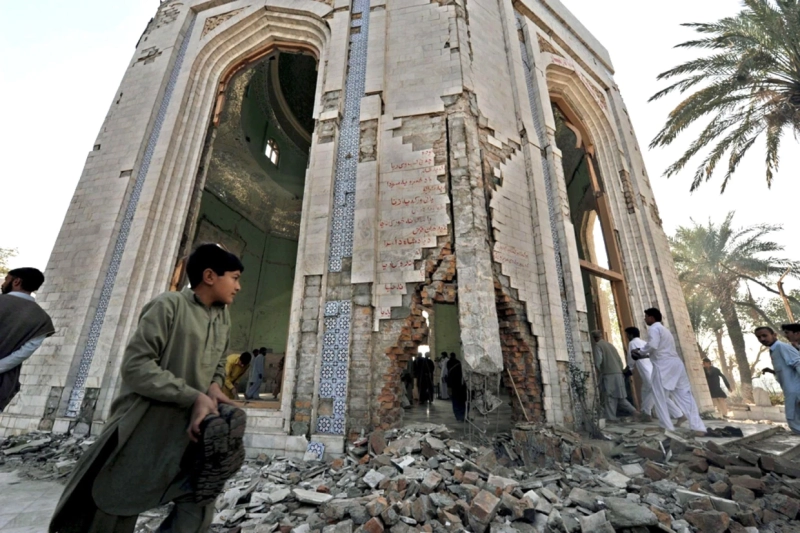 My piece published in The Friday Times
My piece published in The Friday Times
The bombing of Rehman Baba’s shrine is more proof that we are slipping, inch by inch, into an abyss. It is as if the soul of Peshawar, and by extension that of the whole of Pakistan has been scarred by those barbaric bombs and grenades. Among other ironies of the situation, this one stands out: the late Baba was instrumental in disseminating the message of Islam in the Khyber valley and beyond. And today the zealots destroy his shrine for being un-Islamic! A poet of love and tolerance, of amity and forgiveness to be treated in this manner displays how brutal we have become as a society and how fissured our state is. Otherwise a successor of a mighty steel frame, the indigenised state has surely given up to the hordes that are now hell bent on destroying Pakistan.
Rahman Baba was born in 1632 A.D. at Bahadur Kala, a village close to Peshawar. The Pashtuns hold his work in high esteem and his rank in Pashto poetry matches that of Hafiz Shirazi in Persian literature. The simple, down to earth and universal messages of his poetry have been revered by the Pashtuns as well as many adherents of the Sufi creed in South Asia and elsewhere.
In Afghanistan too, Rehman Baba was an icon and his muse was referred to as the ‘heart-beat’ of every Afghan. A friend told me how Saidu Baba, the famed saint of the now destroyed Swat valley, remarked that if the Pashtuns were to pray from a book other than the Holy Quran it would definitely be Rahman Baba’s work. But nothing describes Baba better than what Janes Enveldson had named him: the ‘Nightingale of Peshawar’. Alas, nightingales do not sing in gardens that have been ruined by long, harsh winters or other cataclysms such as hatred and violence.
The decimation of culture at the hands of the bigots’ brigade is not a new stratagem. Centuries ago, Baghdad’s heritage and libraries were destroyed in a similar manner by the Mongols. The British Raj, though far more sophisticated, also ventured to undo indigenous languages and systems in favour of a modern, Protestant ethic. And, in Afghanistan, the destruction of the Bamiyan Buddhas, and later all symbols of cultural life in Kabul and elsewhere were indications of what was to follow. The new age barbarians – the US military – also facilitated the plunder of the Baghdad museum in broad and global daylight, and we all witnessed that real life drama on our TV screens.
But to attack the heart of Pakistan’s culture and its sense of spiritual identity was heartbreaking. The majority of Pakistanis, if one excludes the puritanical sections and the conservative middle classes, practice an Islam that is defined by Sufi principles, and for them a dargah (tomb) or a ziarat (shrine) is central to their spiritual sensibilities. Whether we like it or not, this is the plain reality. Rural Punjabis and Sindhis are deeply attached to their saints, notwithstanding the corruption and other misdoings at the shrines. A few weeks ago, when the Pir of Golra Sharif passed away, half of Islamabad was at a standstill due to the huge numbers of mourners who had come to pay their respects to the departed Pir. The melee was multi-class, multi-ethnic and truly eclectic, for nothing represents the real Pakistan, outside the lifeless textbooks or state decrees on Pakistaniat, than the Sufi shrines.
Other than its reverential status, Rehman Baba’s shrine also provided a little space for women, especially those from the underclass. This is why the residents of the Hazarkhwani area on the eastern outskirts of Peshawar – where the shrine of Rahman Baba is located – have been grumbling for a long time. Apparently, local Taliban groups had issued warnings that if women continued to visit the shrine, they would blow it up. Baba’s philosophy was anathema to the Taliban, who apart from locking up women, closed all Sufi shrines after seizing power in Afghanistan in 1996. For these self-appointed warriors of Allah, women’s interaction with the Sufi spaces such as a dargah promotes obscenity. The Indo-Muslim syncretic ethos so lovingly nurtured by the Sufis, yogis and mystics of this region is now under direct attack in Pakistan.
But should we give up? No. Given the alarming levels of militancy in the region, it is even more important to spread the message of peace and universal humanity of mystics such as Rahman Baba. The residents of Peshawar are already complaining that this attack is yet another attempt, a naked one at that, to eradicate the identity of the embedded secular, egalitarian values of the Pashtuns. That may be a little too romantic but it is a matter of record that Pashtun poetry has always caricatured the Mullah and ridiculed form over spirit. This is in no way different from the messages of Sufi poets of the Punjab and Sindh. After all, that is what brings us together, not the relatively younger idea of a nation-state.
Each April, devotees of Rahman Baba organise a festivalat the mausoleum. Followers of the great mystic-poet from as far away as Afghanistan attend this event. Perhaps this cruel April might not see the festival, but it is imperative that the provincial and federal governments should re-invoke it.
Last year, I had requested my blogger-friend Aadil Shah to translate some of Rehman Baba’s verse. Little did I know how the poet’s lines could be so relevant a year later:
Sow flowers so your surroundings become a garden
Don’t sow thorns; for they will prick your feet
If you shoot arrows at others,
Know that the same arrow will come back to hit you.
Don’t dig a well in another’s path, In case you come to the well’s edge
Humans are all one body,
Whoever tortures another, wounds himself.
When such events are drowned by power-games and other endeavours to satisfy the urge for self-aggrandisment, the recipe is quite clear. Militant and particularistic versions of Islam are politically and culturally unchallenged in the land of the pure. This loss of reason is astounding. Let me therefore ask this question to our over-driven civil society, including the lawyers: what will happen to common law and the freedom to worship if the militants take over Pakistan? History will not be kind to such a society and its intellectuals who have lost themselves in the maze of power-politics.
Raza Rumi blogs at www.razarumi.com and edits Pak Tea House and Lahore Nama e-zines



